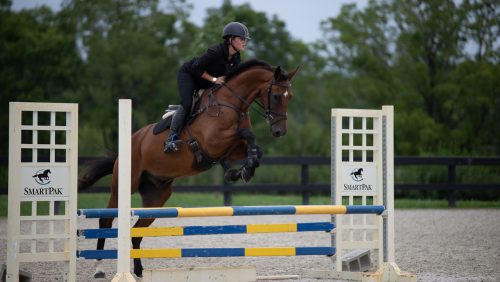When Olivia Knott and her husband David Wilson first set foot on the dusty grounds of the Northern Nevada Correctional Center Wild Horse Training Facility in Carson City, Nevada, in 2016, they had no idea how much the experience would reshape their lives—and their stable. Today they own three Mustangs they purchased through the Bureau of Land Management’s innovative program, which pairs wild horses with inmates for a 120-day gentling and training process.
The once-wild horses are auctioned to the public a few times each year, with the Nevada prison releasing a catalogue and video clips of the green-broke horses in advance of each sale.
Knott and Wilson’s journey began in California, where they were living in Cupertino, in the San Francisco Bay Area. Wilson’s Quarter Horse mare suffered a career-ending injury during an endurance race, and he was looking for a new mount. “I tried a few Arabians and other horses,” he said, “but nothing really clicked. Olivia mentioned the Mustang program after the catalogue came out, and we decided to take a look.”
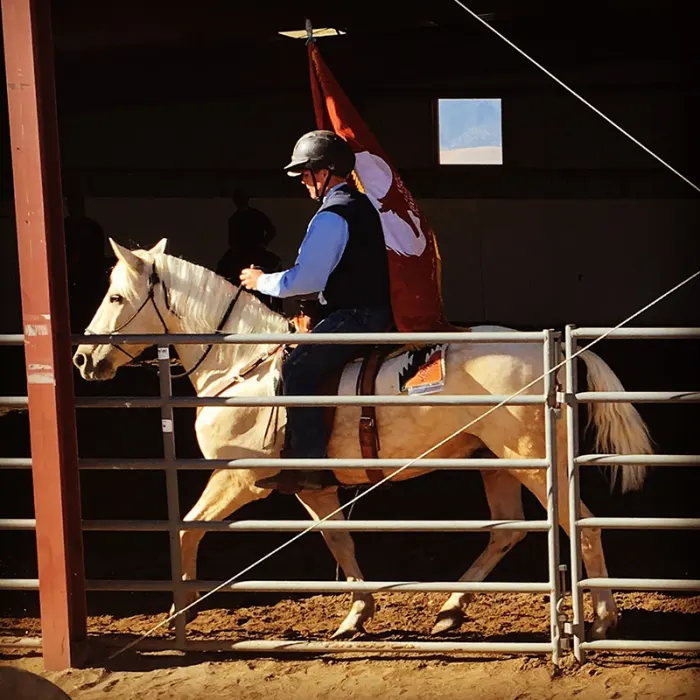
Knott recalled the mix of anticipation and uncertainty as they perused the catalogue listings.
“You have to take the videos with a grain of salt,” she said. “The horses are often scared of the camera crew. But it gives you a feel for what you might be getting.”
The couple drove three hours to the prison with a trailer and a short list of horses. Once inside the secure grounds, they were allowed to speak with the inmates who had trained the horses—an essential part of the process.
“The inmates are very motivated to see the horses succeed,” Knott said. “There’s definitely a little machismo. They want their horse to fetch the highest bid.”
Eugene, a compact bay gelding with an air of quiet intelligence and seemingly endless stamina, caught their eye. They had chatted with some of the inmates about the horses, and Eugene had been suggested as a suitable endurance prospect. After a brief bidding war, he was theirs.
“We weren’t sure what kind of training he’d really had,” Wilson said. “So we sent him straight to a trainer for a month. But honestly, we probably could have brought him home directly.”
Concerned about wildfire risks in the areas where they might have been able to afford a California horse property, the couple moved to Vermont and is now living on a 90-acre farm.
Over the years, Eugene has done it all: 50-mile endurance rides, horse trials, working equitation, cattle sorting and fox hunting. He’s Wilson’s main whip horse with the North Country Hounds, navigating rough Vermont terrain with confidence.
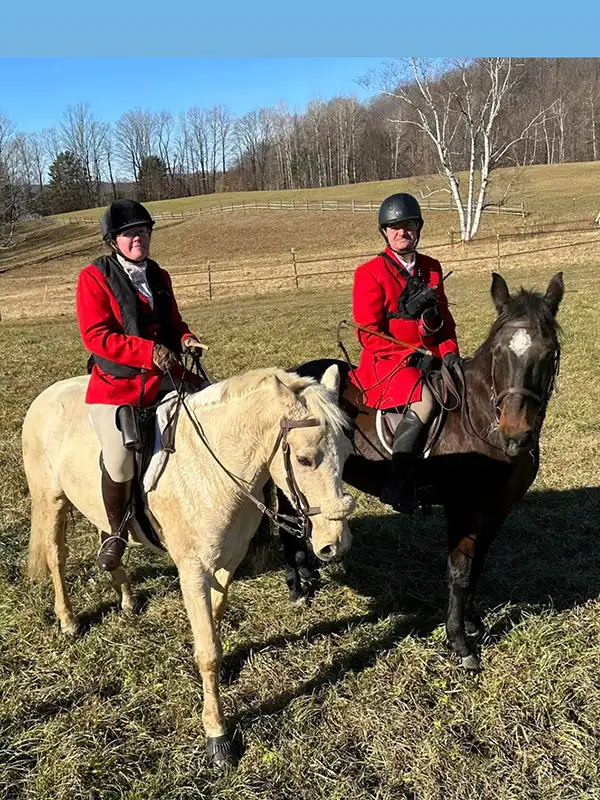
“A clinician in California once commented, ‘He’s never going to the Olympics, but never sell this horse,’ ” Wilson said.
“He’s truly bonded with me,” he added. “Even now, sometimes Olivia can’t catch him—but he’ll let me do almost anything.”
ADVERTISEMENT
Eugene’s wild instincts linger beneath his training, Wilson admitted, especially when confronted with man-made obstacles like bicycles or trail signs.
“In the beginning he was fine with natural obstacles, but man-made stuff was terrifying to him. I’d have to get off if bicycles were nearby. He doesn’t like cut logs on the side of the trail. He’s never been like a spooky, bolting horse, but he’s alert and looking around, and he’ll notice things and question them. He’s always been curious, so we’d try to get him to go closer things to get over his fear, and he’s aways been good about trusting me. I can stand up in the stirrups with trimmers and cut branches on the trails. He trusts me; he’s done everything I’ve asked of him.”
Eventing Mustangs
In 2024 that trust carried Eugene and Wilson to the USEA American Eventing Championships at the Kentucky Horse Park, to compete in the beginner novice championship, a remarkable feat for a horse with his background. Knott, too, competed at the AEC with her own Mustang, Levi.
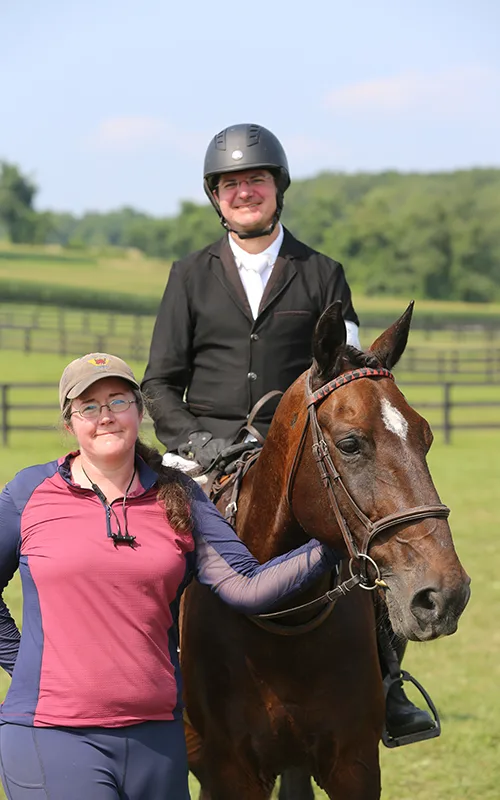
Their success with purchasing Eugene in February 2016 led Knott to adopt her own Mustang at that year’s October auction to be her next eventing partner: Levi, a handsome 16.1-hand gelding with a sweet temperament.
“Levi checked all the boxes,” she said. “He’s 16.1, which is tall for a Mustang, and he has nice conformation. Everything at the [prison] ranch is western—they’ll show off some sliding stops and spins if they’re advanced enough, but they’re definitely not jumping. Levi was shown through the drill team as a flag carrier in a rope halter; the guy was just hanging the rope off the saddle and riding off his seat, so Levi is quite well-trained from that perspective.”
Levi went through the program twice because he had a slight lameness before the first auction, which gave him an advantage, as far as Knott was concerned.
“I’m a wussie amateur who does not want to deal with an unbroke horse, so the extra training appealed to me,” she said. “Every person he meets is his new best friend, though. He’s friendly, outgoing and loves everyone, as opposed to Eugene.”
“That particular program is very well-regarded,” she said. “Some of the ranch hands had worked with horses before, and the horses are getting really good training. It really depends on the horse and the inmate, but all of them are tackable, washable, trained to get on the trailer—though it’s a new adventure to get them on your own trailer!”
Levi’s one quirk is he doesn’t like groups, so foxhunting is not an option for him, but he’s perfectly suited to eventing.
“He’s packed me around at beginner novice for years, even when I’ve completely panicked,” she said.
Despite nerves, Knott and Levi also made it to last year’s AEC and finished—an accomplishment she still takes pride in. “He’s schooled prelim with my husband,” she added. “But he takes care of me.”
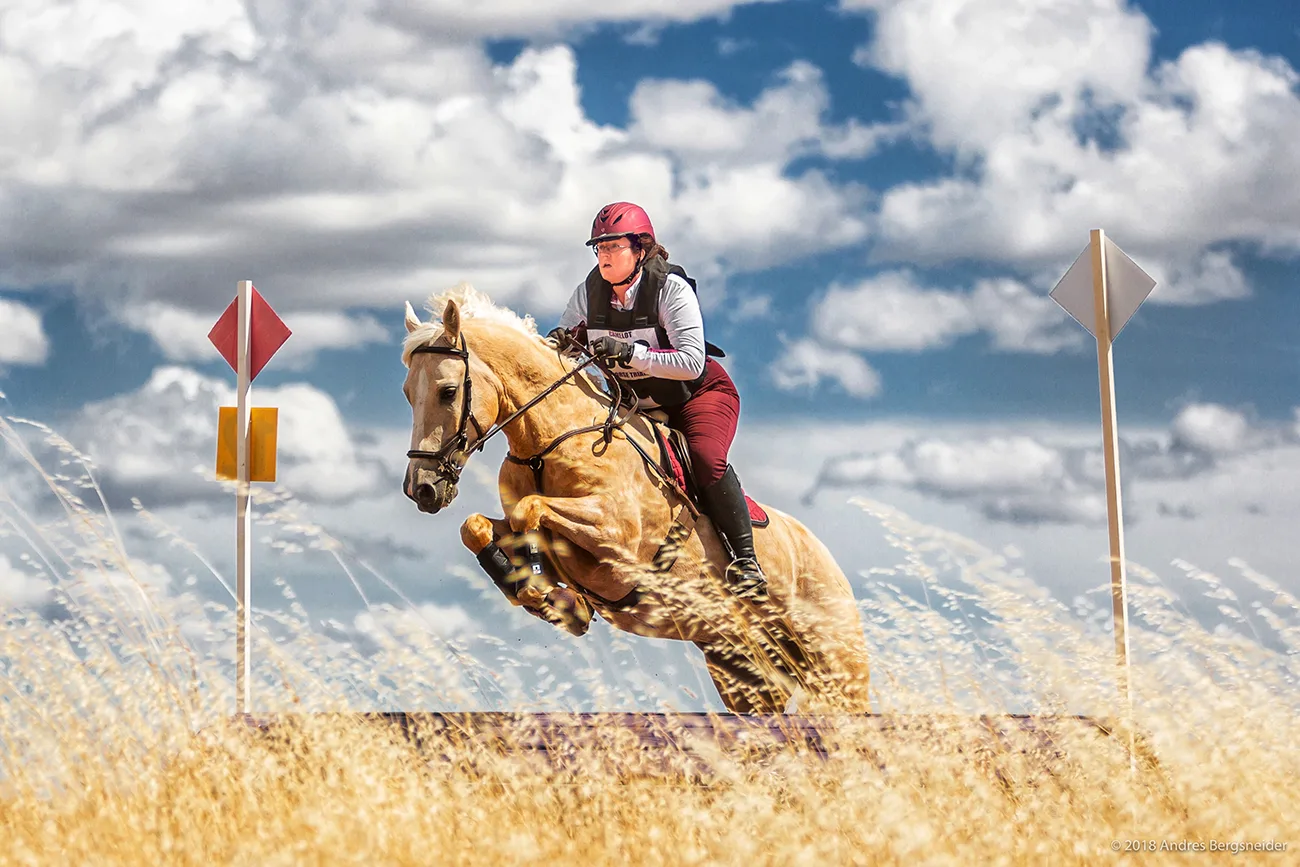
A Herd Of Their Own
ADVERTISEMENT
In 2022, Knott added a third Mustang to their herd: Dune, another graduate of the Carson City program. Though not an eventer like Levi or endurance machine like Eugene, Dune excels at fox hunting, moving calmly through Vermont’s steep terrain and dense forest.
“He just quietly walked down a trail that clung to the edge of a cliff,” Knott said. “That’s the surefootedness Mustangs are known for.”
Wilson is particularly drawn to Mustangs’ innate abilities for his riding pursuits.
“The feeling of riding a Mustang is totally different,” he said. “They’re steady, intuitive, less prone to emotional meltdowns.”
Besides, they’re not just versatile, they’re also resilient. “Eugene grows a coat so thick we don’t blanket him until it’s zero degrees,” Wilson said with a laugh. “And he’s figured out how to slide down the snowy hill just for fun.”
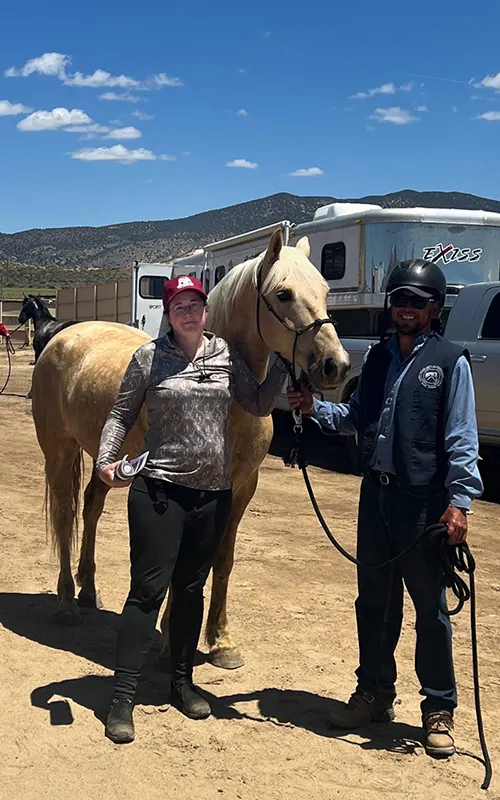
The prison Mustang program itself continues to impress the couple, both in terms of horse quality and social impact.
“Some of the inmates had prior horse experience, and the training reflects that,” Wilson said. “It also teaches the inmates anger management. You can’t lose your temper with a horse, so they learn to handle frustration differently. The recidivism rate is incredibly low.”
Over the years, the couple has encouraged others to consider adopting from the program. “We’ve met people from as far as Hawaii and Virginia at the auctions,” Knott said. “It’s not as easy to organize buying a horse through the prison auction from the East Coast, but it’s worth it. I think the perception is that all Mustangs are wild, but once they’re broke the ones we’ve had are very steady [and] less prone to emotional breakdowns than the Thoroughbreds we’ve had. They’ve lived in a herd, so they’re mostly happy in a big group. It’s nice to be on a horse like that—I’ve taken them into super crowded warm-up arenas at shows and they are fine. As an amateur, I’m doing this for fun, and when you can go and just have fun instead of being anxious that the warm-up is busy, or that the footing is muddy, they’re really enjoyable to ride.”
Plus, Mustangs stand out.
“People are always curious when they find out the horses are Mustangs,” Wilson said. “It’s not a common sight. Some people will ask what breed Eugene is because he’s kind of a mutt [with] a big Roman nose. Everyone’s always interested when they hear it’s a Mustang, and it’s always fun to run into other people on Mustangs since they’re not very common.”
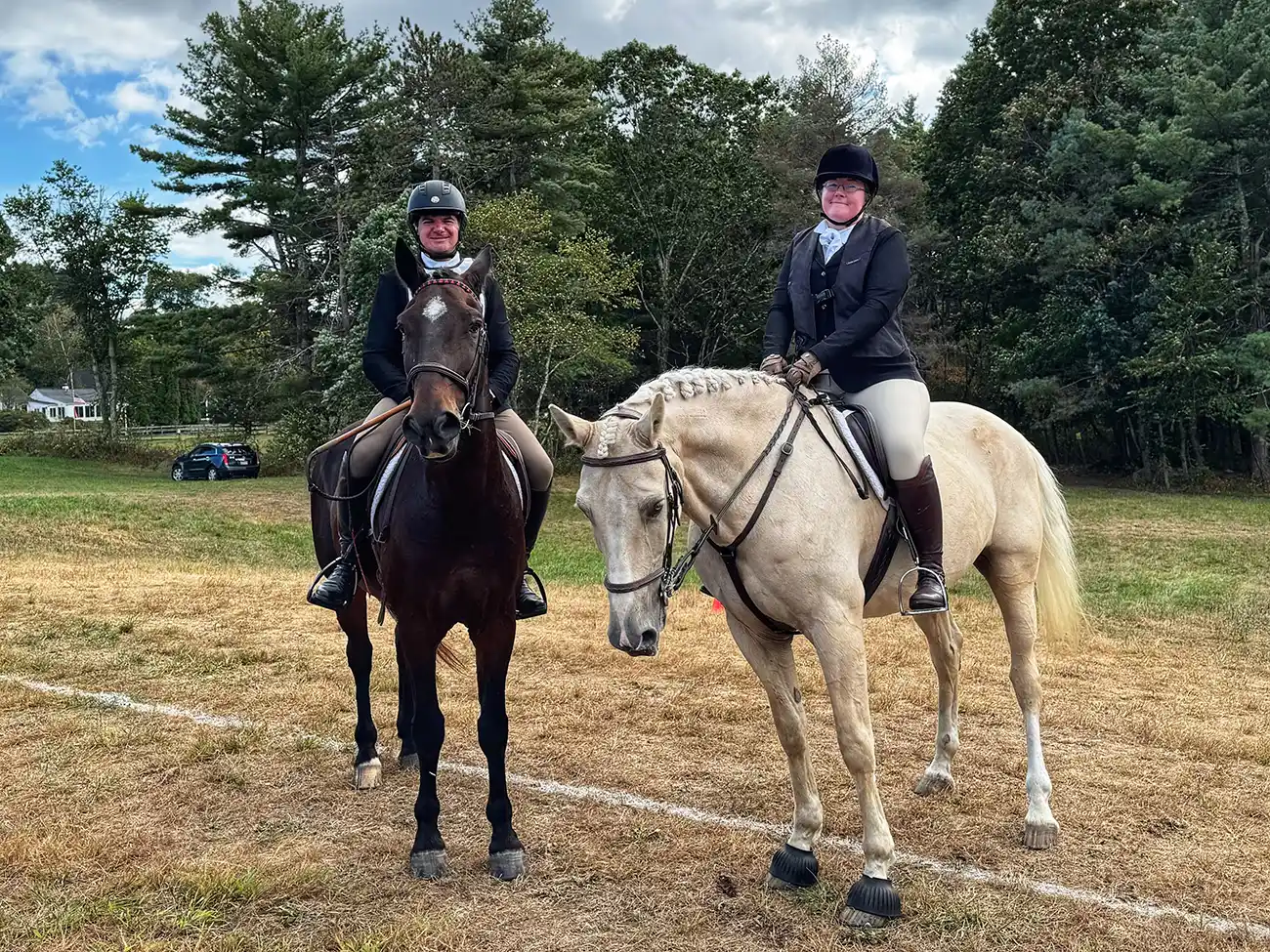
Eugene and Levi recently earned top honors in the pairs class at the New England Hunter Trials. “We can jump the same fence with our legs practically touching,” Knott said. “They’re best friends.”
After nearly 10 years, three Mustangs, more than a few ribbons and first-rate experience with their horses, Wilson summed it up best: “We’ve yet to regret a single one.”
Click here for more information on the Bureau of Land Management Northern Nevada Correctional Center Wild Horse Training Facility and its auctions. The next is scheduled for June 21.






